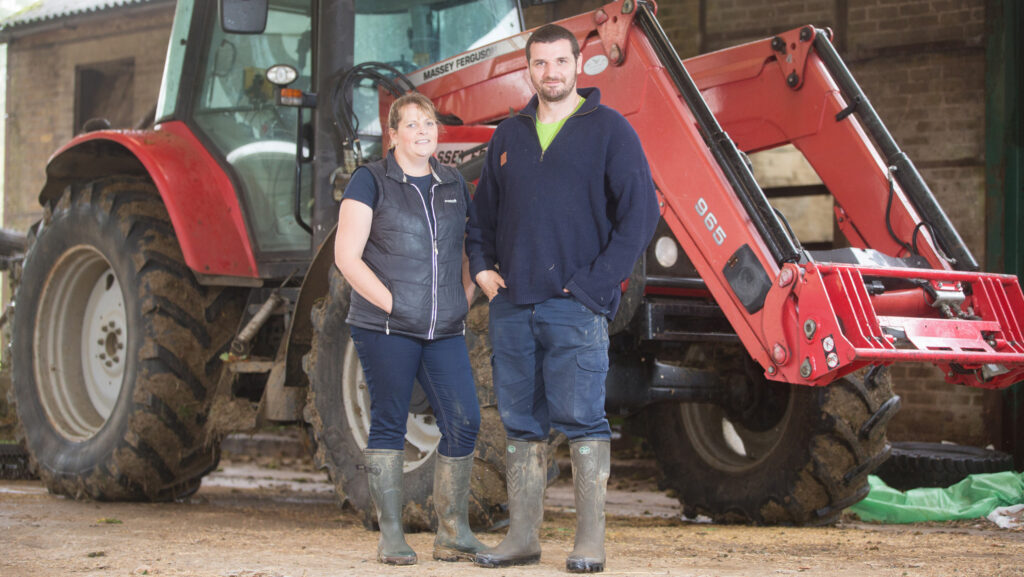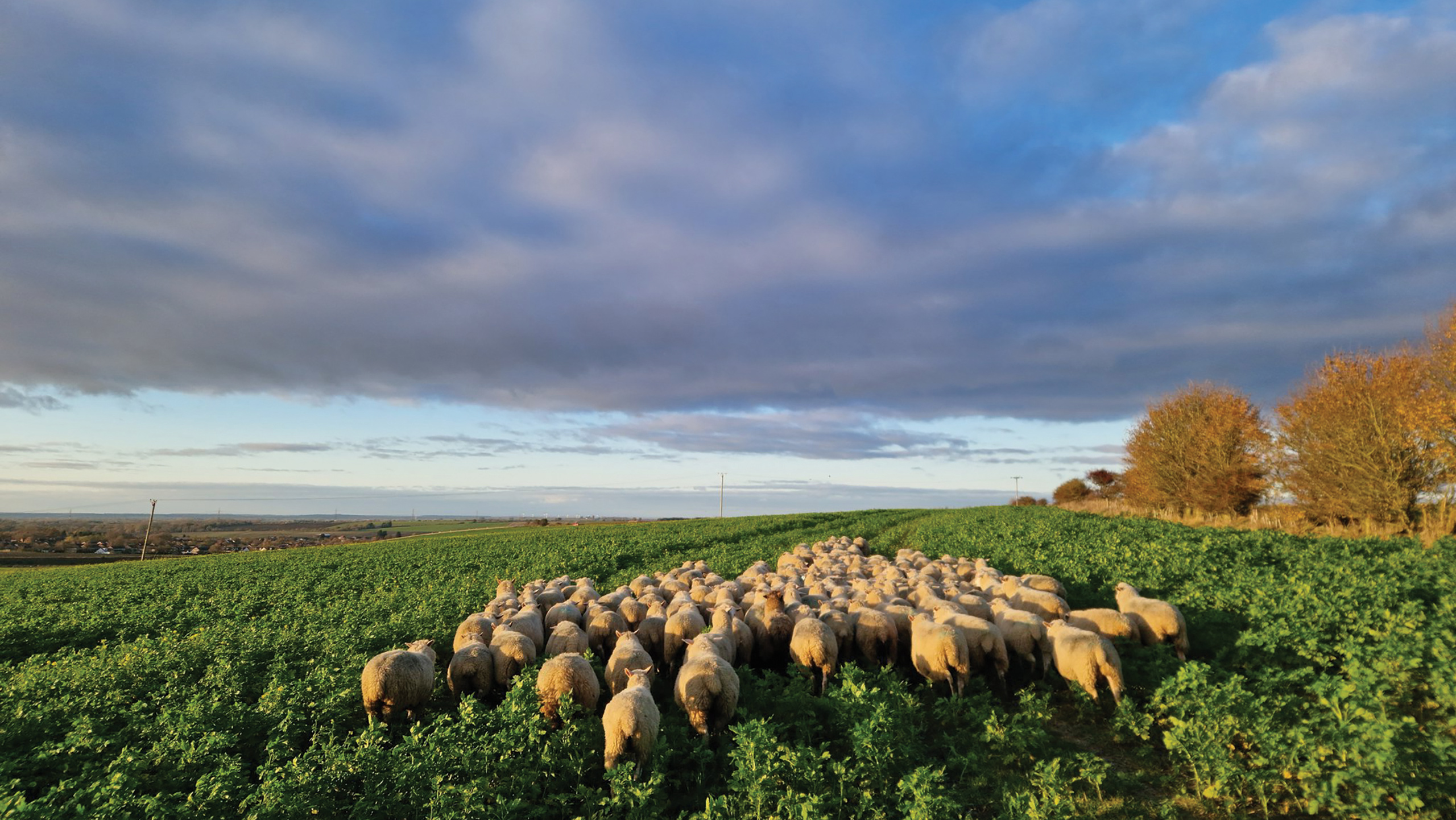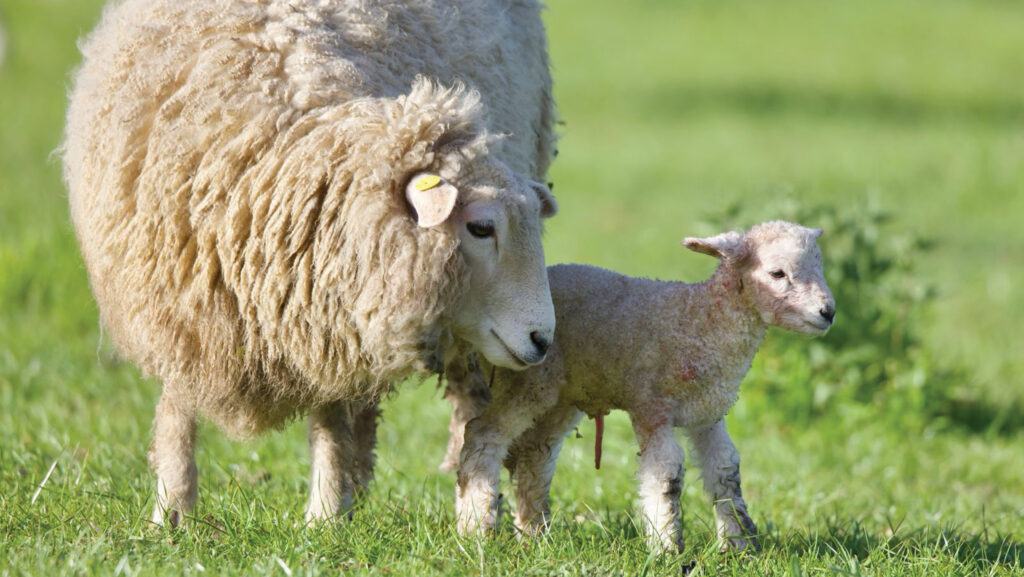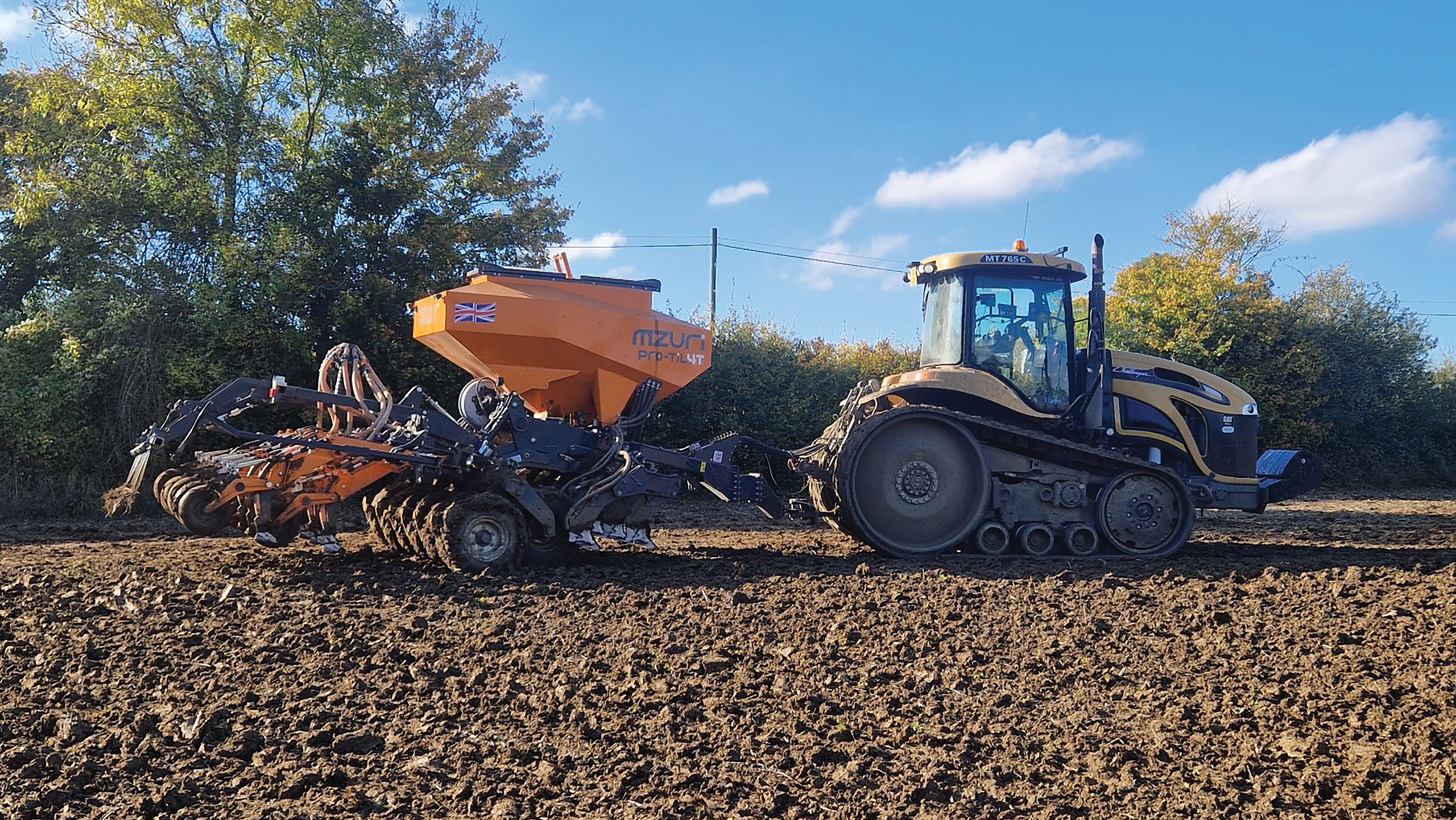Why Herts farming family are moving their business to France
 Jo Franklin and Rob Hodgkins © Tim Scrivener
Jo Franklin and Rob Hodgkins © Tim Scrivener The negative impact on tenant farmers of changes to the Sustainable Farming Incentive (SFI) and the greater return on investment to be found overseas are two of the key reasons why a Hertfordshire farming couple have decided to up sticks and move their farming operations to France.
After meeting during their Nuffield Farming Scholarships, Jo Franklin and Rob Hodgkins set up their tenant farming business Kaiapoi, initially with just 24ha of grazing and 200 Romney sheep, in 2012.
See also: How Arable Insights farmers are using cover crops in rotation
That quickly grew, with Jo winning the tenancy on a 320ha arable farm, and the sheep enterprise expanding by retaining every ewe lamb until 2015.
By 2021 the couple had achieved an ambition of having 2,000 ewes and 2,000 acres (800ha) – one year later than targeted, much to Jo’s chagrin.
“We were going along nicely until 2022-23,” Jo says. “But since then, we have been having to run faster and harder just to stand still.”
In summary
- UK sheep enterprise being wound up and selling stock
- Existing arable operations will remain, at least for the next three harvests.
- Looking to re-establish sheep and cattle business in southwest France
- Planning 1,500 ewes and 100 cattle
Changes to SFI that have made taking land out of production more financially favourable have been a particular challenge the business has faced.
Legume fallow options, for example, which are not one of the restricted options where only a certain percentage of land can be used for it, attract a payment of £593/ha, Rob says.
“Standard arable farm business tenancies are around £375/ha. We lost 480ha to SFI.”
“It has cost us dearly,” Jo says. “We spoke to Defra employees and warned them what it would mean for tenants.
“They said they would make adjustments if they saw anything in the figures, but as we kept telling them, the people it would put out of business wouldn’t exist in any figures.
“They’re graziers and casual tenants because the industry has pushed and pushed for farmers not to commit and stay flexible.
“And landlords want every penny – they don’t want to think of tenants actually having a good run.”

© Rob Hodgkins
Unviable
The result of losing a large chunk of the arable area and the subsequent uncertainty over long-term incomes was to make the Kaiaipoi business model unviable, Jo says.
“We looked at renting other land. But how can you decide what is a sensible rent to pay if you don’t know what your income will be?
“All that uncertainty has killed our business, because we don’t have the fallback of owning a large block of land.”
The timing has been unfortunate. “It was always our plan to buy assets, maximise them and then sell them to buy our own farm,” Jo says.
“We always envisaged buying 200ha and then finding enough diversifications to make that work. And we’re at that point now – we are ready to buy a farm, but frankly the UK is not ready to sell us one.”
That led to some stocktaking to decide how to take the business forward, Rob says.
Options in UK
“There were options to allow us to remain in the UK. We could shrink the business even further with a business plan of managed decline for five to 10 years, to hopefully be in a position to spring forward when things get better.”
That would probably have involved retreating to the remaining FBTs, dropping the grazing licence land so the couple could run it without any outside help.
“It wouldn’t have been very sustainable, and if we wanted a holiday, it would be tricky relying on other local shepherds rather than having staff here,” Jo says.
Another option they considered was to process milk from the sheep dairy business they had started into ice-cream for a pop-up ice-cream parlour.
“I did the business plan as part of my MBA and it suggests after five years this could look good. But it is the type of business where you would need a member of the family present all the time to do it properly, and we don’t have those hours.
“It also became evident that neither of us particularly wanted to serve the public. We have up to 27 landlords to answer to as it is, and with the sheep we’re constantly getting messaged on social media by people giving us their experience, which, of course, is very ‘valued’,” Jo says.
Looking abroad
Instead, they started to look abroad, having kept an eye on other parts of the world since their Nuffield experiences.
Options such as Australia and New Zealand were ruled out. “There are some strong headwinds in New Zealand,” Rob says.
“Because of the number of Chinese buying farmland, and the big corporations buying hill country for tree plantations, they have become quite anti-foreigners buying farmland – it’s becoming quite a political issue.”
It has led to a requirement to obtain Overseas Investment Office (OIO) consent, which involves passing an investor test and proving the purchase will deliver a substantial benefit to New Zealand.
In practice, Jo says they were told they needed about NZ$13-15m (£5.75-£6.67m) in the bank before they could buy anything.
“You’re also at the mercy of China and, as the Chinese upskill [their sheep industry], they need New Zealand less, so they’re having a terrible time currently.”
Australia and the United States have similar political problems that Jo and Rob say they are trying to move away from, including trying to export their food production.
South America and Africa were also ruled out. “I love South America, but it felt too scary, while Africa, I don’t want to live with a gun on my hip,” Jo explains.
France
That left Europe, with some countries ruled out through the cost of land, while the likes of Romania and Bulgaria offered cheap farmland, but were logistically more challenging than the eventual choice of France.
“The main reason farmers from the UK haven’t invested much in France is the difference in inheritance tax. But the argument disappears if that becomes a level playing field.”
Jo’s research suggests French inheritance tax is complicated, but is usually around 35-40%, “which is broadly where the government is pushing for us to be in a few years’ time”.
The difference in France is that the bill is affordable, according to the calculations and business plan put together by Jo and Rob, which suggests they can make a 13% return on their investment.
That compares with the 5% they have been making in the UK, which they forecast would drop to 2% post-SFI. Lower land prices also bring down the liability significantly.
“Calculated returns are based on the level of subsidy you get in headage payments, plus likely selling costs of lambs,” Rob says.
“At the moment, lamb is around €10-12/kg (£8.60-£10.30) in France as opposed to £5-6/kg in the UK.”

© Rob Hodgkins
Finding a farm
It’s not straightforward to finding a farm to buy in France, especially if you’re looking for a decent sized one.
“There’s quite a lot of small farms available, if you just want a lifestyle farm,” Jo says. “But big blocks are more difficult because any land that does come up for sale is offered first to a member of the family, then a French citizen, before a foreigner can buy.”
But with the help of an experienced online agent, Mark Booth at France Farms, they have found two neighbouring farms to buy near Confolens on the border of the Charente and Limousine regions in southwest France.
“They backed onto each other, so there’s an opportunity to consolidate into a bigger block, which will add value straight away,” Jo says.
In total, the couple are buying about 320ha across the two farms, which will allow them to effectively restart the sheep part of the business.
“We’ll have 1,500 ewes and 100 cattle to start with,” Jo says. “The sheep will be a similar system to what we run here, while we will carry on with what the previous owners were doing. We’ve seen their accounts and saw what they’re doing.”
Jo has been particularly impressed by the brand-new cattle sheds on one of the farms, which have 260kW of solar panels installed on the roofs, providing a third business income stream.
“I’ve not seen sheds as good anywhere in the UK. They have remote-control roller shutters on the feed passage doors, for example. It’s done properly because you can afford the investment, whereas everything here is done on a shoestring or with hire purchase agreements. Neither is sustainable.”
While bluetongue restrictions prevent the couple from taking any of their Romney sheep to France, “there are relations of our sheep already in France, which were exported before bluetongue”, Jo says.
“We will buy our starter flock from them, take our own genetics and AI them with that and start selecting from there. It will probably take three to five years to get back where we are now with genetics.”
Selling stock
Jo and Rob are in the process of selling all the current flock, as well as the house and sheep dairy. “It’s a sad process,’ Jo admits.
“And it’s frustrating. We bought some fresh dairy rams from Scotland and the lambs look amazing. I just want to know what they milk like, but I’m never going to know.”
But while the sheep side of the business is being wound up in the UK, the arable will remain, at least for the next three harvests.
“We’ve got the farm business tenancies and SFI agreements, so there’s some financial incentive to see those out,” Jo explains.
That means most of the arable kit will remain. Bought for when the business was 800ha arable, they are over-equipped for the current area, which will mean land can be covered quickly.
Rob and Jo can come back to do some of the arable work themselves – it’s only about a 75-minute flight to Stansted from Limoges – while friends have also agreed to help.
“It’s just not that big a deal,” Rob says.

© Rob Hodgkins
Arable future
What happens with the arable after the three years will likely depend on the economic climate at that point.
“If SFI continues and everything is going well and it’s profitable, we could continue,” Rob suggests.
“Similarly if SFI goes, but rental values drop to an appropriate level to reflect that – £125-200/ha – we could continue.
“If wheat prices collapse, there’s no SFI, we could either sell the last harvest and equipment and take the money, or if arable is good in France, put the machinery on lorries and ship it out to start there.”
Before then, there could be an opportunity to branch out into viticulture, Jo says.
“You can’t just put in vines anywhere in France – there has to be a historic licence. But on about 4ha on one of the farms we think there is an historic licence, so maybe we start playing around with that.”
That’s all assuming the deal gets done. One of the major risks is that between June and October, four different French bodies could say no to the deal, including their French bank and the Société d’Aménagement Focier et d’Établissement Rural, a public interest body that has the right of pre-emption on most rural property, Jo says.
“Obviously our agent is working hard and we and he wouldn’t have got this far if he didn’t believe it was all going to happen. He has been fundamental, attending bank meetings, helping with documentation, which is unreal.
“One contract loan for one of the three businesses was over 1,000 pages.”
While Jo has good conversational French, she admits it’s another matter when dealing with the crucial business language required for this type of transaction.
“You’d be fooling yourself if you thought you could do that, so you have to trust somebody.”
The couple hope the eventual benefits will be well worth the current risk. On the UK farm, which is spread across 12 miles with fields scattered, Rob has calculated that two-thirds of his time is spent driving, checking sheep, setting up mobile handling systems and doing other tasks.
“The change in lifestyle, reduced stress and extra time afforded by being ring fenced is hard to measure, but I think it’s going to have an incredibly big effect on our lives,” he says.
And that will free up time to do some neat stuff, he says, such as building an undercover central handling system and using software such as Farmax to track and analyse performance.
“We’re going to have a crack at building the world’s best sheep farm,” says Jo.

